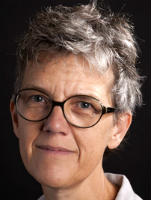Professor Annemarie Mol
The second contributor to the 2014-2015 Munro Lectures is Professor Annemarie Mol.
Incorporations: Human bodies and social sciences
Event details
Date: Thursday 26 February 2015, 5.30pm - 6.30pm
Venue: Meadows Lecture Theatre, William Robertson Wing, Old Medical School, Doorway 4, Teviot Place, Edinburgh, EH8 9AG
Biography

Annemarie Mol is a professor of Anthropology of the Body at the Amsterdam Institute for Social Science Research of the University of Amsterdam.
She is the author of The Body Multiple (Duke University Press 2002) and The Logic of Care (Routledge 2008) and co-editor of Differences in Medicine (Duke University Press 1998), Complexities (Duke University Press 2002) and Care in Practice (Transcript 2010).
Her articles concern themselves with caring bodies, traveling technologies, topological figures, feminist ways of writing, and fluid theorising. She is currently working with a team and an ERC Advanced Grant on Eating bodies in Western Practice and Theory.
Lecture abstract
A classic figure for the relations between the sciences is that of the pyramid in which chemistry and physics are lowest down, biology is situated above them and sociology forms a yet further, higher layer. Explanations go from bottom to top - never the other way around. This comes with a risk for social sciences of being ‘explained away’.
There is less of this in an alternative figure which suggests sciences have horizontal relations as they study adjacent domains of reality: here biologists and medics explore physical facts, while there anthropologists concentrate on the way people give meanings or execute power.
In my Munro Lecture I will present a third topological figure of the way sciences relate: in friction and by mutual incorporation; in tension and by drawing on versions and fragments of one another. To exemplify this I will tell stories about eating and drinking and various ways they are configured by branches of science. So my materials, too, regard incorporations. And this is no accident. For I contend that ‘eating bodies’ deserve to be taken as inspiring models for thinking about a range of concerns - from acting, through knowing, to relating.

